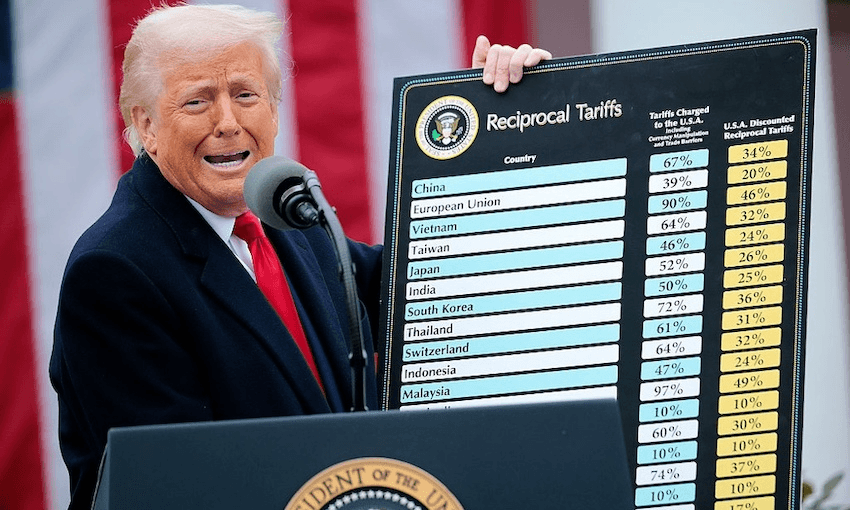ANALYSIS: Stuart Nash’s inglorious resignation delivers a very real warning about the danger of playing big-dick politics on law and order – or in any other ministry for that matter.
Speaking to Mike Hosking on Newstalk ZB on Wednesday morning, Nash was effectively big noting in front of a target audience when he said he had called up the police commissioner, unimpressed at the sentence dished out to a bloke found guilty of weapons offences.
Nash volunteered that he was so outraged that he personally called the police commissioner to ask if police were going to appeal. He actually went on radio and boasted about it.
It really was a case of my tough on crime outrage is bigger than yours.
READ MORE:
* Stuart Nash resigns as police minister after encouraging police commissioner to appeal a ruling
* Cyclone Gabrielle: Chris Hipkins denies outbreak of lawlessness in Hawke’s Bay
* Prime Minister Chris Hipkins reveals his new Cabinet
Indeed, he actually said – in response to questions about the fact that it might have been inappropriate that he was “chewing the fat with a guy who was a mate”.
After Nash’s resignation, Police Commissioner Andrew Coster said: “I regarded the phone call as a venting of that frustration, and nothing more. I felt this was a rhetorical question, not a request, and I did not take any action following the phone call.”
Nevertheless, there is no way no which this was appropriate, even though Nash was not police minister at the time.
Martin De Ruyter/Stuff
Minister for Economic and Regional Development Stuart Nash: I’m this tough on crime. (File photo)
Prime Minister Chris Hipkins said as much after he ran through what the Cabinet Manual – which sets out rules and obligations for ministers – said about ministers exercising professional judgement and not involving themselves in the results of particular cases.
Nash failed the test and Chris Hipkins has ruthlessly dispatched him.
He said Nash offered his resignation as police minister, effectively immediately, and it was accepted. But he keeps his other jobs in economic development, forestry and oceans and fisheries.
The interesting and depressing thing about this case, however, is how much it shows the dangers of enthusiastically ramping up the rhetoric on law and order. Make no mistake, Stuart Nash was reappointed into the job as police minister precisely, so he could go around and chest-beat about being tough on crime and backing the police.
Being a plain speaker on these matters is part of Nash’s political persona.
He is an affable, hail-fellow-well-met sort of person. He’s smart, engaging and enthusiastic in person and clearly loves the fact that, thanks to an impressive gym regimen, he’s informally known around Parliament as “the minister for muscles” and “sun’s out, guns out Stuart Nash”.
He’s also been an important jack-the-lad type figure in a Labour Party that has had issues in the past appealing to men, even if he is not regarded as a particularly effective minister.
There’s nothing wrong with being tough on crime. It’s also where the politics of law and order are at the moment with a bit of a three-horse race between National ACT and Labour, with the Greens and Te Pāti Māori denouncing them.
The causes of crime are complicated, but that doesn’t change the fact it creates real victims and blights some communities. There is nothing progressive about consigning poorer communities to a daily reality of crime.
But treating that with too much relish – as Nash clearly did – can and did degenerate into an exercise in getting out the rhetorical measuring tape and just trying to act tougher on crime than the other guys – which in this case is Mark Mitchell and David Seymour. They talk tough on crime, I’ll do one better.
He’s not the only one, of course. There were some outrageous claims and statements made over looting and crime in the post-cyclone areas of Hawke’s Bay and Gisborne by National and ACT. ACT even wanted to call in the Defence Force.
But Nash was the one who went too far.
It had nothing to do with law and order and everything to do with looking like a tough guy. Neither the public, politics, victims nor the interests of justice are served by this sort of posturing.
ROBERT KITCHIN/Stuff
Prime Minister Chris Hipkins ruthlessly and quickly dispatched Nash in a single day.
Nash crossed a line and, frankly, looked a bit ridiculous.
Many New Zealanders may cheer the fact Nash was outraged by a light sentencing for a gun-related offences.
But the fact is citizens deserve to know their justice will be not be influenced by ministers of the Crown calling up the police commissioner and suggesting to them, in any manner, to go harder on someone.
The question now is whether Nash keeps his other portfolios.
His judgement has to be in question, and it is difficult to see how he can continue to function effectively when he was prepared to make the call he did and then not realise he shouldn’t have made it.
Law and order will be an issue in this year’s election. But this Nash episode will be a timely caution for anyone about playing big dick politics with a complex and very real issue.




















Discussion about this post